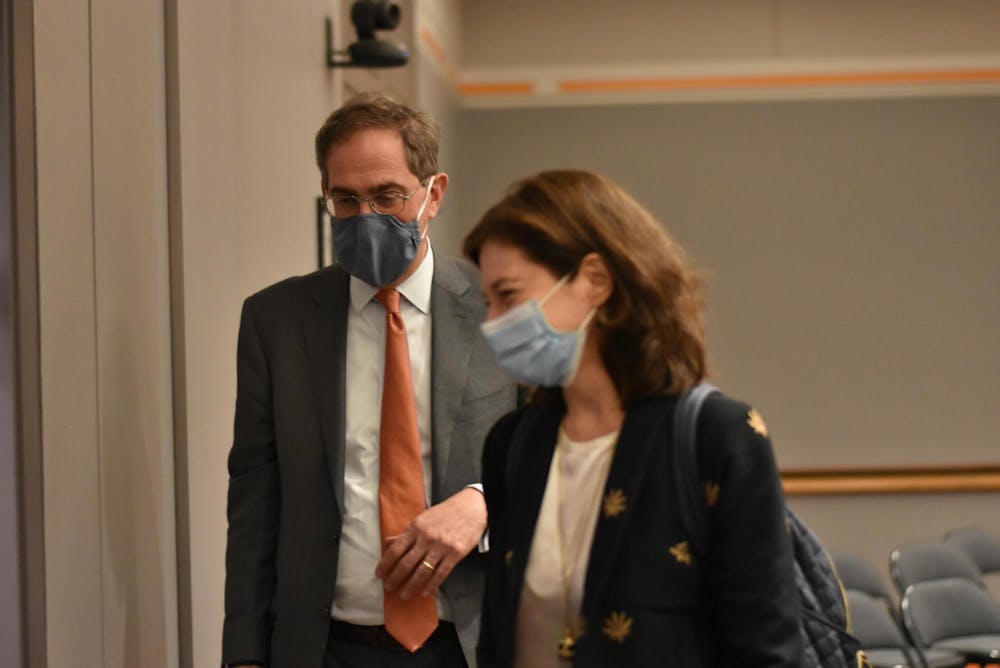President Christopher Eisgruber doesn’t speak publicly much, but when he does, we’ve gotten jarring reminders about how little he understands students and our problems. Take the most pressing campus issue: Princeton’s well-documented mental health crisis, which calls for a transformational response from administration. But instead of taking responsibility for — or having curiosity about — the University’s role as both a potential driver of this crisis and a provider of solutions, he’s blamed it on ‘online activity’ making it hard to “think healthy” and now-infamously belittled students’ concerns with Princeton’s toxic work culture to calls for “academic mediocrity.”
The dismissal from Nassau Hall is not isolated to mental health: Eisgruber doesn’t understand the world and future of young people. He wrote in this paper last year to bemoan the increase in young people “choosing” not to go to college and blamed this trend on “cognitive biases,” missing the fact that college is financially untenable for a vast swath of Americans. He doesn’t treat the climate crisis, which will define the lives of current students, with any urgency. His public statements are mostly about campus free speech, which is less of a real problem to students than it is a problem in off-campus conservatives’ imaginations.
The decision-makers who govern our Princeton lives — both Eisgruber and the Board of Trustees — are disconnected from the student body and don’t show a real interest in our most pressing problems, making it difficult to solve them.
The disconnect isn’t surprising. Eisgruber is a famously isolated president: he holes himself up in Nassau Hall, away from student criticism, and makes himself available to students only rarely and in highly structured formats. And the Board of Trustees is structurally out of touch. Once a year, a committee on student life affiliated with the Board listens to a presentation from USG, and that’s the end of student involvement in our ultimate governance. We have little visibility into their deliberations, can’t tell which ones are voting in our interests, and are only represented by four Young Alumni Trustees (of 37 total) who take a vow of silence about policy decisions in order to run.
This gap between students and decision-makers hinders resolution of student concerns. The Board of Trustees’ lack of accountability and opaqueness means that it’s difficult for students to tell whether their problems are being taken seriously and difficult to engage and advocate if not. And Eisgruber’s disinterest in talking to students, even though he’s the top decision-maker on campus, means that our problems may not even enter the room where decisions are made.
One increasingly urgent problem is the mental health crisis. And it is not intractable. Princeton could vigorously strive for zero suicides — research shows that suicide is preventable — and revolutionize mental health care for students by providing high-quality, innovative, and low-cost care of adequate duration on campus. Princeton could promote behavioral health more broadly through harm reduction on campus to achieve zero overdose deaths. Princeton has extreme wealth, a profusion of dedicated employees, and a massive support infrastructure. We have the means to solve these problems, just not the leadership.
Eisgruber and the Trustees must begin acting meaningfully on behalf of the students. They have made some good steps in the past – four of them, over Eisgruber’s tenure as president: ending grade deflation in 2014, deciding to slightly expand the student body in 2016, partially divesting the endowment from fossil fuels, and somewhat expanding financial aid in 2022. Next, they need to take on the mental health crisis.
So, here’s a challenge to Eisgruber and the Board: listen to us and take visionary steps to address our problems. Step up – and if you’re not ready to, step aside.

Eleanor Clemans-Cope (she/her) is a sophomore from Rockville, Maryland intending to study economics. She spends her time making music with Princeton University Orchestra and good trouble with Divest Princeton. She can be reached on Twitter at @eleanorjcc or by email at eleanor.cc@princeton.edu.
Correction: A previous version of this article stated that grade deflation was ended in 2004, when it was actually ended in 2014. It also stated that there are two Young Alumni Trustees, when there are four.









